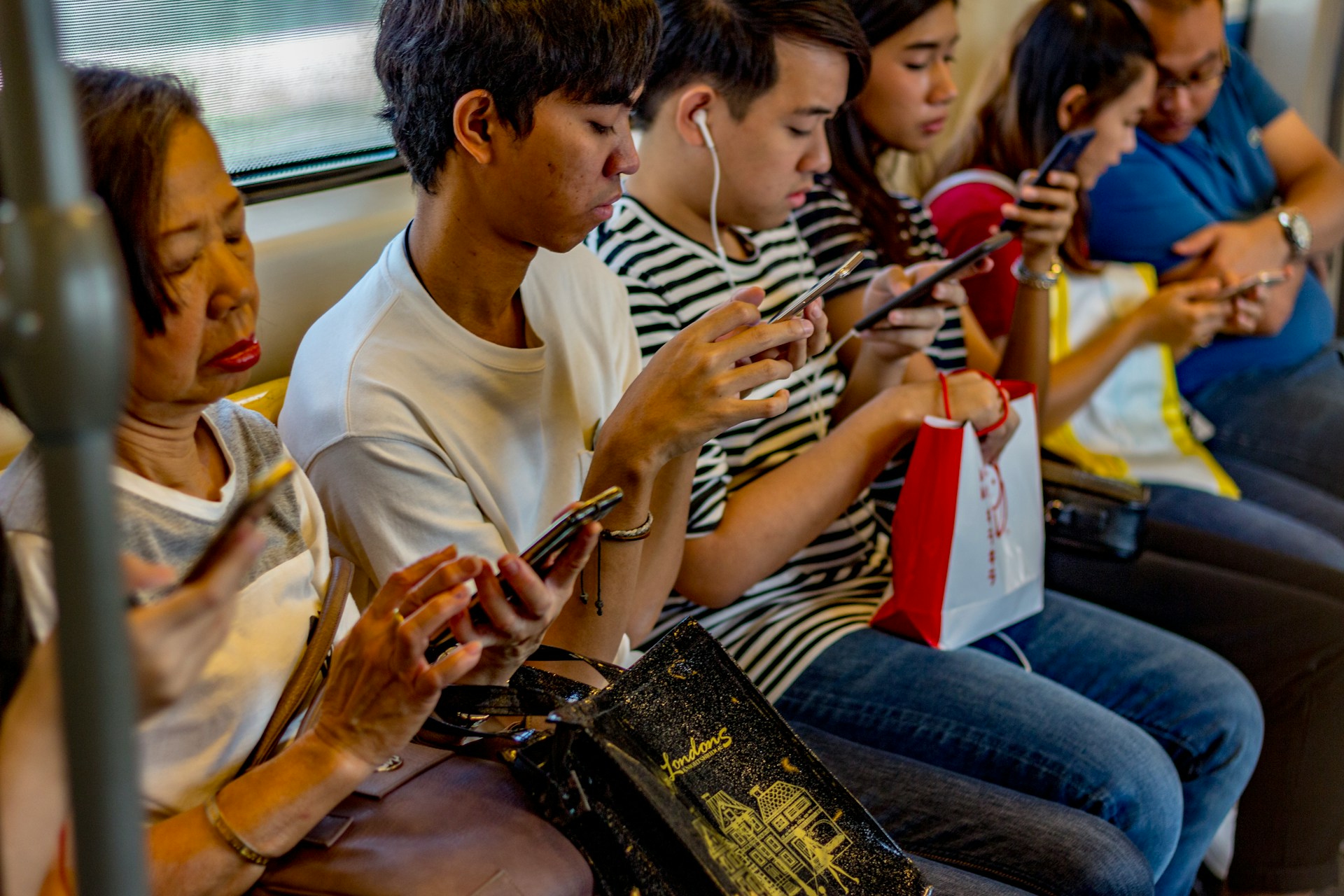-
Agree Some data show that early, heavy, and relatively persistent social media and mobile phone use can reduce attention spans and result in negative well-being effects.
Professor Lara Aknin
Distinguished Professor of Social Psychology, Simon Fraser University -
Completely agree The negative effects of social media go well beyond attention span, to personal growth, lack of challenge and lack diversity of experience, poor social connection skills, and beyond. The emerging evidence is clear, and while there are a few positive effects, and negative substantially outweigh the positive...
Professor Aaron Jarden
Associate professor, Faculty of Education, University of Melbourne -
Completely disagree I believe there is currently no strong, uncontested evidence that social media or mobile phone use significantly affects memory span. Even if future research were to confirm such an effect, the practical consequences of a shorter memory span would remain uncertain. We live in a technological era where social media and mobile devices are deeply embedded in everyday life, shaping a new cognitive and social niche. In this context, a shorter memory span may not necessarily be harmful. It is plausible that humans are adapting their cognitive abilities to fit this niche rather than experiencing a deficit. Of course, any otherwise normal behavior can become harmful if it turns into obsession or addiction.
Professor Mohsen Joshanloo
Associate Professor (Psychology), Keimyung University, South Korea -
Neither agree nor disagree The welfare effects are highly heterogeneous. Some people are negatively affected, but other people gain substantial welfare.
Professor Daniel Benjamin
Associate Professor of Economics, University of Southern California -
Neither agree nor disagree I probably don't know enough about the emerging literature on the impact of new digital technology on well-being to comment sensibly on this issue, BUT that said, my thinking is: (i) most research has focussed on the impact on the well-being of young people, implying that effects on the wider (and hence older) population may be small or minimal; (ii) the negative effects on young people's well-being are often argued to be partly the result of exposure to bullying behaviours and other peer effects, so not clear to me how important the channel via reduced attention span is; (iii) use of digital technology provides many benefits, which presumably must at least partly offset its negative effects; (iv) I doubt there is any research that has to date convincingly demonstrated a causal relationship between social media and mobile phone use and population well-being in the long-run (though I would expect this to change in the future as the birth cohorts that grew up with this technology age).
Professor Mark Wooden
Professorial Research Fellow and Director of the HILDA Survey Project, Melbourne Institute: Applied Economic and Social Research, Faculty of Business and Economics, University of Melbourne -
Completely agree Any Google search will come up with plenty of research in support of this statement - even AI "knows" it - and the mechanism is intuitively plausible: constant fracturing of attention across multiple stimuli on a phone, and between a phone and reality, leads to poor attentional habits that nonetheless deliver short-run reward for people as they get small hits of social approval, schadenfreude, or other positive feelings from their e-activities. Hence, the habit develops and is difficult to break.
Professor Gigi Foster
Professor, School of Economics, UNSW School of Economics -
Neither agree nor disagree evidence for "major long-run negative effects" is extremely poor and expert judgment is being influenced by their values more than facts
Doctor Anna Alexandrova
Senior Lecturer in Philosophy of Science, University of Cambridge (UK) -
Neither agree nor disagree It does appear to be the case that attention spans of adolescents and young adults have been reducing over the past couple of decades at the same time as use of social media and mobile phones has increased. However, the evidence of a causal link is very weak (see: Odgers, 2024, and the references to meta-analyses that she cites). Alphenaar et al. (2025) find that negative (and positive) effects on subjective wellbeing are dependent on personality types; for instance more introverted people have reduced positive affect as their social media use increases. That study also finds that too little social media use (<45 minutes per day) is associated with lower subjective wellbeing! These and a range of other studies indicate that we should be wary about jumping to conclusions about the effects of social media and mobile phone use based on correlations rather than on causal analyses. Concern with the effects of new technologies is not new. It is worth recalling that in Plato's Dialogue, Phaedrus, he quotes Socrates's criticism of writing: "For this invention will produce forgetfulness in the minds of those who learn to use it, because they will not practice their memory. Their trust in writing, produced by external characters which are no part of themselves, will discourage the use of their own memory within them. You have invented an elixir not of memory, but of reminding; and you offer your pupils the appearance of wisdom, not true wisdom, for they will read many things without instruction and will therefore seem to know many things, when they are for the most part ignorant and hard to get along with, since they are not wise, but only appear wise." References: Alphenaar, L.E., Shiner, R.L., Arana, C.C. et al. Social Media and Subjective Well-Being: The Moderating Role of Personality Traits. J Happiness Stud 26, 61 (2025). https://doi.org/10.1007/s10902-025-00898-0 Odgers, C. L. (2024). The great rewiring: Is social media really behind an epidemic of teenage mental illness? Nature, 628(8006), 29–30. https://doi.org/10.1038/d41586-024-00902-2
Professor Arthur Grimes
Chair of Wellbeing and Public Policy, School of Government, Victoria University of Wellington -
Agree I tend to agree but note that there seems a dearth of methodologically strong (i.e. experimental) studies providing evidence for this
Professor Martin Binder
Professor of Socio-Economics at Bundeswehr University Munich -
Neither agree nor disagree I'm not sure we properly know this yet - the long-run aspect - but it seems possible. We can be a bit more certain in the short-term. Also does any negative effect including wellbeing dissipate with reduced use? There is some evidence for this (e.g., Abrahamsson 2024) which indicates that reductions in use now may temper any long-run negative wellbeing effects.
Professor Alan Piper
Lecturer in Economics, University of Leeds -
Agree Scientific evidence confirms that social media and mobile phone use reduce attention span (Ra et al. 2018; Thorell et al. 2024), while less attentional control is associated with lower well-being (Zhang 2025). While reduced attention span is only one of several mechanisms driving the long-run negative wellbeing effects of increased social media and mobile phone use have (Braghieri et al. 2022; Xiao et al. 2025; also see Jonathan Haidt’s book “the anxious generation”), it aligns with the dopamine addiction model, in which repetitive exposure to highly stimulating content leads to heightened dopaminergic activity, raising the threshold for reward and driving compulsive use and negative affective states. Less attentional control is also associated with lower self-efficacy and poorer performance, as it reduces one’s ability and confidence to successfully complete tasks of longer duration. References: Braghieri, L., Levy, R.E., & Makarin, A. (2022). Social media and mental health. American Economic Review, 112(11), 3660-3693. Ra, C. K., Cho, J., Stone, M. D., De La Cerda, J., Goldenson, N. I., Moroney, E., ... & Leventhal, A. M. (2018). Association of digital media use with subsequent symptoms of attention-deficit/hyperactivity disorder among adolescents. Jama, 320(3), 255-263. Thorell, L. B., Buren, J., Ström Wiman, J., Sandberg, D., & Nutley, S. B. (2024). Longitudinal associations between digital media use and ADHD symptoms in children and adolescents: a systematic literature review. European Child & Adolescent Psychiatry, 33(8), 2503-2526. Xiao Y, Meng Y, Brown TT, Keyes KM, Mann JJ. Addictive Screen Use Trajectories and Suicidal Behaviors, Suicidal Ideation, and Mental Health in US Youths. JAMA. 2025;334(3):219–228. Zhang, Q. (2025). Trait anxiety predicting the developmental trajectories of depression symptoms in children: The mediating role of attentional control. Development and psychopathology, 37(2), 633-644.
Professor Martijn Hendriks
Associate Professor, Erasmus University Rotterdam & University of Johannesburg -
Neither agree nor disagree I agree with the first part of the statement: Social media and mobile phone use reduce attention span. Although, it is clear that the intention of most social networks is to retain people's attention as much as possible. Curiously, the strategy to retain people's attention as much as possible is based in reducing the lenght of most interactions. Regarding the second part of the statement (resulting in major long-run negative wellbeing effects), I think we lack good evidence to conclude about long-run impacts. There are good theoretical frameworks that argue that there is a wellbeing cost associated with shortening attention span -as well as by extending time spend in social media and mobile phones-, but more time may be required to empirically establish the long-run effects associated with the impact of social media and movile phone use on well-being. I would also like to call for greater attention to the social trends that are driving these social processes. Greater use of social media and mobile phone may be the consequence of very efficient strategies (such as infinitum scrolling) designed by major corporations to maximize profits. In addition, technological innovations ceased to be the result of flashes of genius and became developments generated by large laboratories driven by the pursuit of greater profits. Other social factors may play an important role. For instance, social median and mobile phone use emerge from a sense of existencial emptiness, as well as a desire for connection. It may also serve as a medium of escaping from what is perceived as an increasingly hostile world. In these cases, it becomes much more difficult to establish a direct causal link between social media and mobile phone use and their effects on well-being.
Professor Mariano Rojas
Professor of Economics, Universidad Popular Autónoma del Estado de Puebla -
Agree The best cross-country measures we have of educational achievement (PISA) show large declines in reading, maths, and science achievements starting from the period of Smartphone rollout (2010-2012). More detailed studies that explore this data typically show similar effects on academic achievement but also on other factors that affect wellbeing such as bullying (e.g. Beneito and Vicente-Chirivella, 2022). While it is not possibly to completely rule out other confounding factors, the prima facie case against mobile device use is compelling.
Doctor Conal Smith
Principal, Kōtātā Insight -
Completely agree Constant exposure to rapid, fragmented content trains the brain to seek immediate rewards and novelty, undermining our ability to sustain focus on complex tasks. Over time, this attention fragmentation not only impairs learning and productivity but also diminishes emotional regulation and overall life satisfaction.
Professor Lina Martinez
Profesor, and Director of POLIS - Center for Wellbeing Studies, Universidad Icesi -
Agree A key assumption in this statement is that a reduced attention span necessarily leads to major negative wellbeing effects. While there is evidence suggesting that the use of these technologies can reduce attention span, the link to wellbeing outcomes is less clear. It seems plausible that wellbeing could be negatively affected, but the extent and mechanisms are still open to discussion. In my view, social media use raises the most concerns. Beyond reduced attention, social media often fosters social comparison and a sense of constant availability, both of which have been linked to lower wellbeing. Continuous notifications further fragment attention and contribute to cognitive overload. General mobile phone use, however, should be viewed more differentiated. Its impact on wellbeing likely depends strongly on how phones are used. When phone use replaces face-to-face interaction, for example, when people ignore those around them, it clearly tends to undermine wellbeing. At the same time, phones also provide access to tools and applications that support everyday functioning and can, in some cases, enhance wellbeing. Another factor is media multitasking, which may indeed reduce attention span. Yet it is important to acknowledge that mobile phones have become functionally indispensable in modern life, particularly for children navigating education and social life. In conclusion, while I agree that social media use poses notable risks to attention and wellbeing, the broader claim regarding mobile phone use requires more nuance. The effects on wellbeing depend critically on usage patterns, and a reduction in attention span does not automatically translate into a reduction in wellbeing across all contexts.
Doctor Antje Jantsch
Researcher, Leibniz Institute of Agricultural Development in Transition Economies (IAMO) -
Completely agree The research on attention spans declining is very clear, so the only question is whether it is a bad thing that all generations have difficulty thinking deeply about anything. The research on that still has to be be done, but I see strong arguments for its negative effects: productivity is decreasing, the new generations are postponing long-term relationships and family formation, health is decreasing as people are prey to simplistic solutions, community cohesion is down, mental health problems are up, hyper-sensitivity is up, and so forth. Our societies have a major problem and are only slowly waking up to it. The solution will have to come from resilient communities reorganising themselves radically.
Professor Paul Frijters
Professorial Research Fellow, CEP Wellbeing Programme, London School of Economics -
Agree The evidence for reduced attention span is quite voluminous. The evidence for that then flowing onto wellbeing is a bit more haphazard. There are a lot of contextual and even idiographic factors to consider. For example, social media is especially important to people who belong to niche identity groups and find it difficult to connect locally (e.g. trans people in hostile small towns). This sort of thing tends to get concealed in population averages.
Professor Mark Fabian
Associate Professor of Public Policy, University of Warwick -
Agree This is not my area of expertise. My gut from using social media and smart phones and from observing others is that people's subconscious expectations of the world change through frequent long-term use. A recent mini-review does indicate social media and mobile phone use are connected to lower attention (Shanmugasundaram & Tamilarasu, 2023). Assuming true, reduced attention span is likely connected to lower conscientiousness, which is connected to subjective well-being, as well as labor and health outcomes. Thus, lower attention spans is connected to traits we know are bad for current and long-run well-being. Shanmugasundaram, M., & Tamilarasu, A. (2023). The impact of digital technology, social media, and artificial intelligence on cognitive functions: a review. Frontiers in Cognition, 2, 1203077.
Doctor Kelsey J O'Connor
Researcher in the Economics of Well-being -
Agree The use of social media and mobile phones is a global phenomenon. The digital tools have different impacts on different individuals with different attributes, in different places (some are developed than others) and in different ways. Marketers use the social media extensively to advertise on Facebook, Twitter. Instagram, Tik Tok ... to influence buyers, especially the young generation, who needs to catch up with trends, brands, influencers, and emulate others (demonstration effect effect). Once customers are captured, there is the need for constant engagement on social media platforms. When one is young, one may be interested in new products exposed through social media, that creates an aspiration gap between what one has and what is 'new'. Some persons cannot afford new items, but the social media pressures may influence new purchasing on credit, thinking these would enhance happiness/wellbeing, only to be disillusioned soon, as newer trendy products emerge. Elderly persons may be cautious with social media trappings and may not get tangled up with Facebook video advertising, for example - No drop in dopamine, no regret, no adverse impact on their well-being. Social media is designed for quick attention- grabbing activities, which may reduce concentration span for the 'dull' ones. Tik Tok has very short videos to grab attention. Instagram focuses primarily on photos and video content, which are very short. The reduction in attention spans imply that some children are constantly entertained and don't feel bored. However, children exposed to today's digital era constantly use smart phones and ipad, but do not necessarily play outside, and with AI may not use independent thinking power smartly. Would this not impact on wellbeing in the longer term- something that can be established by empirical studies, with time series data. Currently, many teens are already exposed to online predators and cyberbullying; these can raise the risk of adverse mental conditions and depression in the longer term (R. Layard, 2021- Book 'Can we be Happier? Evidence and Ethics). People use social media and mobile phone for social and task-related activities. Good to stay connected with friends and family members - maintaining social capital at a local and global level, with a hedonic pull factor, adds to happiness and wellbeing at all times, though. However, constant scrolling of the phone at each notification beep pulls away a person from tasks, reduces cognitive focus or attention span, and can impact on timeous task completion, with negative wellbeing effects in the long run, when one is addicted to the digital tools. I advise my senior students to switch off their laptops in class to reduce in distractions and mind-wondering. They tend to perform better. A better academic result can add to a better life satisfaction. At times, it pays to be switched off from social media - gives time for deep thinking, soul searching, meditation and peacefulness with no anxiety- all contributing positively adding to health and wellbeing.
Professor Darma Mahadea
Associate Professor and Honorary Research Fellow at the University of Kwazulu-Natal, South Africa -
Completely agree I agree with this. It does seem though that the impact varies by duration spent on the phone and not even by content. It seems that long spells on the smartphone impact attention and take kids away from beneficial activities. An hour or o is fine
Professor David Blanchflower
Professor of Economics at Dartmouth -
Completely agree I completely agree with this statement because the negative effects are now clearly established, as emerged from the symposium on "Why Youth Well-Being Is in Crisis — and What We Must Do About It." This recently concluded symposium has been co-organized by the Dartmouth College and UNDP and it brought together researchers from various disciplines from around the world (Dartmouth, NH, Oct. 25-27, 2025).* The first type of evidence that has emerged shows the coincidence between the explosion of mental health problems among young people around 2010-2015 and the avaliability of mobile phone equipped with camera, which has enabled social media to become dominated by images and videos. No other event (economic, social, conflicts) alignes so closely with the explosion of youth mental problems, in both the turning point and the period since, at least for the US. It has further shown for many countries that young people in the last 5-10 years exhibit worse mental health than middle-aged people, whereas before, young people exhibited better mental health. According to the third type of evidence, the mere possibility to access the internet and social media through dedicated technological infrastructure actually causes harm to the mental health of the young, thus overcoming the limits of correlations. Two further main findings emerged as robust: girls and the less well-off are those most affected by internet and social media use. This is the effect on a social level, which does not exclude that a minority of young people can benefit greatly from the use of social media. And this made the issue very controversial. * https://home.dartmouth.edu/events/global-turning-point-why-youth-well-being-crisis-and-what-we-must-do-about-it
Professor Maurizio Pugno
Full Professor of Economics, University of Cassino -
Neither agree nor disagree This question combines several issues: social media use, mobile phone use, attention span, and possible long-term effects on well-being. To keep it focused, I will consider social media and its impact on attention span. To begin, it is important to define the term "social media." After a quick Google search, I found that there are as many definitions as possible. Considering a few of these definitions, it appears that they share the following: they are Internet-based platforms that enable the creation and exchange of user-generated content among virtual communities and networks. (Kaplan & Haenlein, 2010, boyd & Ellison, 2008; Obar & Wildman, 2015). Furthermore, I can only answer the question based on my own teaching experience. I will illustrate the link between social media (specifically, short YouTube videos) and attention span through my postgraduate students, who are mostly Generation Z and younger Millennials. This group prefers short, visually engaging material, such as brief YouTube videos that explain key concepts. The “short videos” are viewed by the majority of the students, and in feedback, they describe these as the most helpful resource. In contrast, when I upload journal articles, engagement (in terms of views and downloads) tends to be lower, and students often request that I highlight only the most important sections. This suggests that they prefer short, visual, and easily understandable content, which is typical of social media formats such as TikTok or Instagram Reels. Whether social media directly causes a reduction in attention span needs further research. If it is only a question of attention span, even older generations, who did not grow up with social media, have always had limited attention spans: consider traditional lectures or public lectures, where even the best lecturers or speakers can only hold the audience's attention for a few minutes before the audience's focus begins to drift. Therefore, while social media may intensify our preference for brief content, it did not invent short attention spans. It has simply made them more visible.
Professor Talita Greyling
Professor, School of Economics, University of Johannesburg -
Completely agree It is well documented that the use of social media and mobile phone reduces attention span and has the potential to reduce human cognitive capacity. If this is true, those individuals more expose to social media and mobile phone (for example, the children who spend afternoons alone or go to schools that do not control mobile phone use) will have less opportunities in the education system and labor market. In this case, we would expect increasing inequality. If everyone makes a similar use, there will be no inequalities. Nevertheless, the negative impact on individuals’ cognitive skills will deteriorate wellbeing to the extent that individuals will have fewer opportunities to find and generate wellbeing.
Professor Ada Ferrer-i-Carbonell
Professor of Economics, IAE-CSIC -
Agree I agree with this statement, but I think that the negative well-being effects of social media are due to a number of factors. The main factor is probably social comparison (i.e., watching curated, unrealistic images/content and thus developing unrealistic expectations; developing a negative self-image). Reductions in attention span can certainly also cause long-term negative well-being effects. For example, by reducing the ability for deep work, which is particularly relevant for knowledge workers. The dopamine hit/quick rewards from notifications and new content can also negatively affect people's ability to focus, which again would be detrimental for employment/school/etc.
Doctor Anke Plagnol
Lecturer in Psychology (Behavioural Economics), City University, London -
Agree The question is framed in a less than clear way, conflating social media use with overall mobile-phone use (which can include email, calls, music, navigation, and other non-social tasks), which can blur both the extensive margin (use vs. non-use, with self-selection) and the intensive margin (time by specific activity)! Different formulations can lead to… different answers. Regardless, experiments show that smartphone proximity and notifications can reduce attention and working memory and impair performance (Beland & Murphy, 2016), while short-term Facebook deactivation yields modest improvements and population-level associations with adolescent well-being are near zero (Allcott et al., 2020). If social media and mobile phone use substitute totally or in very big proportion vital daily activities such as sleeping, going outside and social interaction with friends to a large extent, this will negatively affect the health stock, which is the strongest determinant of well-being. However, using social media and mobile phones for small amounts of time to perform healthy activities might contribute to maintaining good health capital and therefore have a positive effect on individual well-being. References Allcott, H., Braghieri, L., Eichmeyer, S. & Gentzkow, M. (2020) ‘The Welfare Effects of Social Media’, American Economic Review, 110(3), pp. 629–676. Beland, L.-P. & Murphy, R. (2016) ‘Ill Communication: Technology, distraction & student performance’, Labour Economics, 41, pp. 61–76.
Professor Daniela Andrén
Senior Lecturer, Örebro University School of Business -
Completely agree Yes, the attention span reductions seem well enough studied to connect them logically to long-run negative wellbeing effects. I'm informed here in part from Cal Newport's summary of the evidence on focus and distraction (e.g. in "Deep Work"), in addition to the claims of many about society at large. Several phenomena should be distinguished, though. Push notifications (does arriving email make a noise?) have a big impact both in the moment and on dopaminergic system training. Separately, algorithmic feed provision replaces choice (and creativity) about what is interesting, what to focus on, which underlies all independence of thought. Separately, algorithmic manipulation à la Facebook towards emotional reactivity, outrage, radicalization, and superficial-evidence / superficial-thought filter bubbles seems apocalyptically toxic. Separately, engaging devices substitute for normal social, outdoor, exploratory, and risk-taking play. Except for the last one, these are not special to children. They are also not inevitable with / intrinsic to "social media" or mobile phones.
Professor Chris Barrington-Leigh
Professor, McGill University

In October 2025, members of the World Wellbeing Panel were asked for their views on two statements relating to social media use.
The two statements were as follows:
Statement 1: Social media and mobile phone use reduce attention span, resulting in major long-run negative wellbeing effects.
Statement 2: Urgent intervention in the form of restrictions on social media and phone use is needed to protect the attention span and normal development of children.
Response options for each statement were: “completely agree”, “agree”, “neither agree nor disagree”, “disagree”, “completely disagree”.
Below are the distributions of these categorical responses, followed by a discussion. You can click where indicated to see respondents' detailed written comments.
Social media and mobile phone use reduce attention span, resulting in major long-run negative wellbeing effects.
Urgent intervention in the form of restrictions on social media and phone use is needed to protect the attention span and normal development of children.
-
Disagree I would like to see more large-scale, pre-registered experiments on the topic.
Professor Lara Aknin
Distinguished Professor of Social Psychology, Simon Fraser University -
Agree Restrictions are one part of the answer, but not the only answer... The root of use is underpinned by parenting approach, parent availability, cost of alternatives to phone/social media use, school resources, and a lot of other factors... Young people also need to be taught how to use social media to avoid dangers and overuse, in order to obtain a longer-term solution that prevent illbeing impacts...
Professor Aaron Jarden
Associate professor, Faculty of Education, University of Melbourne -
Completely disagree The weight of empirical evidence does not suggest that social media or mobile phone use, in itself, is harmful or warrants drastic measures. In fact, research has also documented positive benefits associated with these technologies. Rather than banning or censoring their use, it is more constructive to educate both young people and adults on healthy and balanced ways to engage with these tools. Of course, if these behaviors escalate into addiction, appropriate interventions should be taken.
Professor Mohsen Joshanloo
Associate Professor (Psychology), Keimyung University, South Korea -
Agree Particularly in school contexts and for children prone to the negative effects, limitations on mobile phone use are urgently needed.
Professor Daniel Benjamin
Associate Professor of Economics, University of Southern California -
Disagree Overall, I am very skeptical about the value of relying on government to restrict social media and phone use by children, and especially if by restrictions what is meant is bans. First, it is not clear how use of mobile phones outside of school hours could be restricted. Second, if we focus on social media use, bans come at a cost in the form of the loss of opportunities for education, creativity, and social connection that social media can provide. Third, but related to the previous point, digital literacy will be critical for life in adulthood, something that will be even more important for our younger generations. Fourth, it is not clear how effective such bans can be effectively enforced. In Australia, where bans on social media use by children are soon to be implemented, the presumption is that it is the social media platforms that will need to police enforcement. But how will YouTube, for example, prevent children from accessing You Tube content? All it can do is attempt to prohibit children from establishing an account. Overall, there is clearly a role for policy interventions, but less clear is that this should take the form of restrictions on use. More effective would be delivery of education programs that provide children with the skills to make the most effective use of digital technology. There is also a case for better regulation of social media platforms.
Professor Mark Wooden
Professorial Research Fellow and Director of the HILDA Survey Project, Melbourne Institute: Applied Economic and Social Research, Faculty of Business and Economics, University of Melbourne -
Completely agree I agree that restricions are sorely needed to protect children, but i do NOT think that the proper form of such restrictions is for governments to implement age retrictions on media use or to implement any other top-down mechanism. Families, schools and communities must work out for themselves what is a reasonable and workable set of restrictions (norms that restrict usage, and possibly penalties for violating those norms) to help children recover their attention spans (not to mention self-esteem and other normal functions), as part of taking back responsibility for their own health and wellness. Any top-down government mandate is sure to be abused.
Professor Gigi Foster
Professor, School of Economics, UNSW School of Economics -
Disagree Negative effects from such an "intervention" can be very serious too
Doctor Anna Alexandrova
Senior Lecturer in Philosophy of Science, University of Cambridge (UK) -
Neither agree nor disagree Given the weak causal evidence on negative wellbeing effects of phone and social media use, widespread (and urgent) interventions to reduce such use are not advisable. Nevertheless, interventions such as banning mobile phone use in schools makes sense to maintain concentration of students while at school - just as reading comics instead of books at school was banned (or at least discouraged) in past generations.
Professor Arthur Grimes
Chair of Wellbeing and Public Policy, School of Government, Victoria University of Wellington -
Neither agree nor disagree Should parents be aware of this and deal with it, yes. Do we need urgent political regulation? I am less convinced. In the past, parents could park their children in front of a TV or otherwise neglect their development, are phones and social media different? How?
Professor Martin Binder
Professor of Socio-Economics at Bundeswehr University Munich -
Neither agree nor disagree Education on the suspected consequences would be useful to supplement restrictions in school and to inform parents. (The urgent in the statement stopped me from agreeing - any intervention needs to be informed (i.e. well-thought out), and informative (i.e. reasons clearly explained to those affected, and the likely benefits).
Professor Alan Piper
Lecturer in Economics, University of Leeds -
Completely agree Excessive use of social media and mobile phones, which particularly occurs among younger generations, is considered a major factor contributing to the decline in happiness among young adults, who were once among the happiest age groups but, since the advent of smartphones and social media, have become among the least happy (Blanchflower 2025). Governments have a duty of care, which includes protecting children from the harmful effects of social media and smartphone use, given its proven negative effects on mental health and well-being. A complete ban on social media and phone use is not realistic. However, I support less far-reaching restrictions, including the following: 1. A ban or restrictions on smartphone use in class or during school hours, which have been implemented in some countries. 2. Minimum age requirements for children’s access to social media (preferably age 18). While these restrictions are difficult for governments to enforce, they are effective in discouraging use and signaling the adverse effects to the population. Such restrictions must be supplemented by additional measures, such as obligations on platforms to moderate content and to prevent exploitative features that encourage excessive use. Reference: Blanchflower, D.G., Bryson, A., & Xu, X. (2025). The declining mental health of the young and the global disappearance of the unhappiness hump shape in age. Plos one, 20(8), e0327858.
Professor Martijn Hendriks
Associate Professor, Erasmus University Rotterdam & University of Johannesburg -
Agree I would like to highlight that statement No. 1 was very general in terms of the population it referred to. Statement No. 2 clearly focuses on children. I believe it is important for kids to have a palette of activities that go far beyond the intensive use of social media and mobile phones. Expanding this palette of activities and motivating kids to explore other interests may require significant restrictions on social media and phone use. It may also call for a review of current trends in the educational system; children should feel enthusiastic about going to school and learning something interesting, and educational programs should open windows for them to discover and enjoy the richness of the world. In addition, it is important to examine what is happening within household contexts: what factors at home contribute to children becoming fully absorbed in phone and social media use?
Professor Mariano Rojas
Professor of Economics, Universidad Popular Autónoma del Estado de Puebla -
Agree The case for negative impacts from social media and phone use is compelling and easily clears the bar to suggest that policy intervention is warranted. There is some evidence that bans at school can have positive impacts. However, it is likely that school bans will be insufficient to address the broad range of issues associated with mobile device usage. Given evidence that content associated with negative affect (e.g. envy, anger) and may be addictive (Amirthalingam and Khera, 2024) there may be a case for exploring treating algorithmic social media feeds alongside potentially addictive pharmaceuticals.
Doctor Conal Smith
Principal, Kōtātā Insight -
Completely agree Intervention should combine regulation, education, and design reform. Governments should establish clear age limits and screen-time guidelines, require platforms to verify users’ ages, and restrict addictive features such as endless scrolling and algorithmic recommendations for minors. Schools should include digital literacy and mindfulness programs to teach students how to manage attention and use technology consciously. Parents and caregivers should model healthy phone habits, create device-free routines, and prioritize offline activities that strengthen focus and emotional connection.
Professor Lina Martinez
Profesor, and Director of POLIS - Center for Wellbeing Studies, Universidad Icesi -
Disagree I do not believe that "urgent" interventions are the appropriate response, though I do support more targeted interventions (particularly concerning social media use among young people). My position on intervention is that, rather than imposing restrictions on mobile phone use, educational institutions should prioritize teaching healthy and balanced approaches to device use. Mobile phones have become an integral part of modern life, and restriction-based strategies might risk leaving children unprepared for the digital environments they will inevitably inhabit. The notion of "urgency" may overstate the case. While attention spans may indeed be shortening (driven not only by phones but by broader features of modern environments) this should be seen as an adaptation challenge (similar to all other technological progress) rather than a crisis. From an evolutionary perspective, humans have always adjusted their attentional capacities to changing contexts. In today’s information-rich world, a shorter attention span may not necessarily indicate deficiency. It may represent an adaptive response to new cognitive realities. That said, I do support regulation where clear risks exist. Social media platforms, in particular, warrant stricter age-based regulation and design requirements to reduce harmful features such as infinite scrolling and algorithmic amplification of comparison-inducing content. Looking ahead, the goal should not be to recreate the attentional conditions of a pre-digital era, but to equip children with the cognitive skills to manage their attention in a distraction-rich world. Building these skills will serve them far better than attempting to roll back technological change.
Doctor Antje Jantsch
Researcher, Leibniz Institute of Agricultural Development in Transition Economies (IAMO) -
Neither agree nor disagree Urgent interevention is needed, yes, but I am not convinced on the notion of top-down government restrictions. They will be easy to circumvent. Rather, I think we should much more seriously think about resurrecting the importance of smaller communities for only within those can one tackle addictions and free-riding. How do you resurrect smaller communities? By stepping back as the state and transferring power to communities. Since the direction at the moment is in the exact opposite in most countries, we will need to watch more community-oriented places like Switserland and rural US communities to see what they come up with as counter-measures to the negative effects of social media and phone use. I suspect the problem will first get far worse before good examples are found and followed.
Professor Paul Frijters
Professorial Research Fellow, CEP Wellbeing Programme, London School of Economics -
Neither agree nor disagree I really don't know. I am reluctant to say "we need to wait for the evidence" because producing "clinching" evidence in this context is very slow and the potential harms are quite large and urgent. I would be inclined towards regulating the tech companies rather than the users. For example, banning the slot-machine style of most of these apps, expecting stronger sanctions against influencers spreading nonsense (as China has done), moderating harmful content like pro-anorexia accounts more aggressively. On the demand-side, not having phones in class for typical students seems an obviously sensible policy but much more than that often feels like parenting cop-out. We can teach people how to behave differently rather than regulating them. This requires a relational approach, something contemporary public policy seems quite bad at.
Professor Mark Fabian
Associate Professor of Public Policy, University of Warwick -
Agree It is well-agreed upon that there are positive and negative outcomes associated with social media and phone use. Restrictions should only be based on context and population group specific evidence. I believe the best case for restrictions comes from (Bursztyn et al. 2024), who find students generally choose to have a social media account, but would prefer that the platform be dropped altogether. Thus students themselves would like restrictions! Bursztyn, L., Handel, B. R., Jimenez, R., & Roth, C. (2023). When product markets become collective traps: The case of social media (No. w31771). National Bureau of Economic Research.
Doctor Kelsey J O'Connor
Researcher in the Economics of Well-being -
Agree In South Africa, some secondary schools have already forbidden the use of phone during school hours. The same restriction has been applied in Australia. Other countries may follow suit as well. AI may increase productivity of learners in certain ways, but it may also impact on the cognitive reasoning and logic of children, when exercises are to be done for students by ChatGPT, for example. While intervention is primarily left to caregivers, possibly as parents and older siblings, large corporations in the digital arena should also have protective measures for children. This might mean restricted time access, and access to restricted content to changing the speed and volume of content.
Professor Darma Mahadea
Associate Professor and Honorary Research Fellow at the University of Kwazulu-Natal, South Africa -
Completely agree Seems so although we dont have great evidence on the impact. For example does it work the same for 8 yr olds versus 15 year olds. We also don't know if kids compensate by going home and spending 9 hours on the phone after school.
Professor David Blanchflower
Professor of Economics at Dartmouth -
Completely agree I completely agree, because social media is extremely dangerous to the mind of young people. Moreover, the argument based on individual freedom cannot be easily applied as long as young people prefer to stop using social media only if others do the same, thus becoming individually trapped by actions beyond their control (as demonstrated by experiments). Intervention is thus urgent. But how to restrict its use, for how long, at what age, and how to accompany it with with educational interventions aimed at making them more attractive, also through using social media, is not yet a well-defined matter. But once again, urgency calls for experimentation on the field, and many organizations are committed to this. While the problem is already too advanced to be easily treated, the call for action remains. The availability of AI, in fact, reminds us that we are now facing another strictly linked danger, one that could be even more serious.
Professor Maurizio Pugno
Full Professor of Economics, University of Cassino -
Agree The idea that we urgently need to restrict social media and phone use to protect children’s attention spans and development is understandable. Yet, the real question is how such an intervention could be implemented effectively. Most likely, some action is needed, but we must decide whether it should happen at the national level, within schools, or on the digital platforms themselves. Governments could introduce regulations to establish age restrictions or require more parental controls. However, enforcing these rules is another question. Platforms such as TikTok, Instagram, and YouTube operate across borders, making national regulation likely ineffective. Such measures are also “detrimental” to social media business models that rely on keeping users online. Interventions are necessary, but the approach needs to be broad-based, including parents, digital education and the buy-in of social media platforms.
Professor Talita Greyling
Professor, School of Economics, University of Johannesburg -
Completely agree From all the above, it seems clear that we need urgent interventions. The children development will be negatively affected and so will be their freedom, political and social participation, labor market performance, social interactions,….
Professor Ada Ferrer-i-Carbonell
Professor of Economics, IAE-CSIC -
Agree I agree, but this is very difficult to enforce. There are already age restrictions on some social media platforms, but it is not difficult for children to circumvent these. For example, if they simply need to state their birth date, it's obviously easy to fake this. Limiting phone use can also be difficult to enforce. For example, many parents give mobile phones to their children when they start going to school by themselves and phones are thus also seen as an important safety feature when young teens become more independent from their parents (they can call parents; parents can track them on Google maps and similar). A general social media and/or phone ban thus seems quite unrealistic and maybe not even desirable for parents. However, what would be enforceable is more regulation on online advertising to children/teenagers and what kind of content they can see online (including on social media).
Doctor Anke Plagnol
Lecturer in Psychology (Behavioural Economics), City University, London -
Agree "Regulation" is warranted but must be paired with education. Time-bound, age-appropriate rules are defensible because specific phone/social-media features (e.g., notifications, proximity, infinite feeds) impose acute attention costs and displace sleep, which in turn crowds out offline skill-building (Carter et al., 2016). School-day phone restrictions can improve academic performance (Beland & Murphy, 2016). Yet digital leisure is now central to adolescents’ socialization, so durable change requires coordinated norms among policymakers, schools, and caregivers (OECD, 2025). Regulation should therefore be complemented by active education on time-use, protecting physical activity, in-person social contact, and sleep, and by prior social-media-literacy training so young people develop psychologically informed skills for balanced, safe, and meaningful use (APA, 2023). Importantly, guidance should keep children connected rather than isolated from societal progress: messaging with parents, accessing school portals, and creative/learning apps are not equivalent to endless scrolling. Sweden’s public-health guidance exemplifies proportionate limits: rule-of-thumb daily caps (e.g., 1–2 hours for ages 6–12), keeping devices out of bedrooms, and avoiding screens before bedtime, framed as non-binding recommendations to support sleep, activity, and mental health (Folkhälsomyndigheten, 2024; Folkhälsomyndigheten, 2025). Beland, L-P. & Murphy, R. (2016) ‘Ill communication: technology, distraction & student performance’, Labour Economics, 41, pp. 61–76. Carter, B., Rees, P., Hale, L., Bhattacharjee, D. & Paradkar, M.S. (2016) ‘Association between portable screen-based media device access or use and sleep outcomes: a systematic review and meta-analysis’, JAMA Pediatrics, 170(12), pp. 1202–1208. Folkhälsomyndigheten (Public Health Agency of Sweden) (2024) Recommendations for children’s and adolescents’ digital media use. Solna: Folkhälsomyndigheten. https://www.folkhalsomyndigheten.se/contentassets/ab9cc71603f84f048dadf4c2851032f6/recommendations-childrens-adolescents-digital-media-use.pdf Folkhälsomyndigheten (Public Health Agency of Sweden) (2025) ‘Till dig som har barn i åldern 6–12 år’ (guidance page). Solna: Folkhälsomyndigheten. https://www.folkhalsomyndigheten.se/livsvillkor-levnadsvanor/digitala-medier-och-halsa/hjalp-ditt-barn-pa-natet/till-dig-som-har-barn-i-aldern-6-12-ar OECD (2025) Finite time to learn and play: PISA 2022 insights on digital leisure, learning and well-being. Paris: OECD Publishing.
Professor Daniela Andrén
Senior Lecturer, Örebro University School of Business -
Completely agree Yes but a narrow focus on children may alienate and blame more than is appropriate. Based on my answer above, one needs to identify several specific dangerous / toxic aspects of the platforms and technology, and design policies in light of the details. Secondly, there is a much bigger principle at play. It's called the Precautionary Principle. I strongly object to the idea that we need perfect RCT evidence on harms before intervening. For many things in life, like ecological systems, complex sociopolitical institutions, etc, rapid change itself should be avoided because we cannot understand or evaluate or react appropriately when complex systems change fast. Therefore, we should be limiting and slowing down the impact of social media and phones as soon as we have good reason to believe the damage may be large. The extent to which this is true even when the benefit could also be large (ie with uncertainty about both) is a matter for debate, but in this case the upsides for children are vastly more circumscribed and limited than the possible downsides of a generation of disconnected, distracted, anxious, herd-like, and shallow citizens.
Professor Chris Barrington-Leigh
Professor, McGill University
Analysis
Wellbeing Statement 1:
This month we asked our panellists to respond to the idea that “Social media and mobile phone use reduce attention span, resulting in major long-run negative wellbeing effects.”
A clear majority (18/26) of our panel either agreed or completely agreed with this statement; 7 panellists were neutral (“neither agree nor disagree”) while 1 completely disagreed. There was stronger support in the written responses (including from some neutrals) with the first half of the statement (“reduced attention span”) than there was for the latter half (“long-run negative wellbeing benefits”).
Greyling provided a useful definition of social media uses as applications relating to “internet-based platforms that enable the creation and exchange of user-generated content among virtual communities and networks.” Respondents were generally more concerned with social media use than with mobile phone use per se. A number of responses noted that whereas social media use may cause harms, mobile phone use could, on balance, be beneficial (Jantsch, Andren).
Several of those expressing agreement with the first half of the statement (Barrington-Leigh, Hendriks, Mahadea, Plagnol, Martinez) pointed to research that lengthy social media use leads to heightened dopamine activity in the brain. In turn, this raises the threshold for reward which can driving compulsive use, resulting in negative affective states.
Relatedly, social media use may reduce attention spans as people become hooked on short pithy ‘hits’ such as those in TikTok or Instagram videos (Foster). Poorer educational attainment in some countries over recent years, lower conscientiousness and negative productivity trends may be the result of reduced attention spans which then lead to lower wellbeing (Smith, Frijters, Pugno, Ferrer-i-Carbonell).
More generally, significant exposure to social media may reduce focus and independence of thought (Barrington-Leigh). Time spent on social media is an opportunity cost, reducing in-person social engagement (Jarden) and reducing children’s participation in outdoor activities. Several members noted that the content viewed, rather than the duration of viewing, may be a critical factor in determining the effects of social media use (Wooden, Mahadea, Andren, Blanchflower).
Benjamin suggested that effects are likely to be heterogeneous. Furthermore, Fabian hypothesised that connectivity through social media may be important for some marginalised groups who find it difficult to meet locally.
Most panellists who were neutral towards the proposition (and some who ‘Agreed’) suggested that there was a lack of evidence that any effects of social media use (e.g. on attention span) has had a causal impact on long-run wellbeing (Wooden, Alexandrova, Grimes, Piper, Rojas, Binder). It may still be too early to establish whether short-term impacts in this respect have long-run consequences. Furthermore, Joshanloo considered that adaptation towards having a shorter memory span may be beneficially suited to the new technological era.
Rojas called for more attention to the trends that are driving greater use of social media use. These trends include profit-seeking behaviour by corporations, a sense of existential emptiness and a wish to escape from an increasingly hostile world.
Greyling made the observation that, prior to social media, “older generations … have always had limited attention spans … even the best lecturers or speakers can only hold the audience’s attention for a few minutes.” In a related vein, Grimes quoted Socrates’ warnings (as relayed by Plato) about the advent of writing: “For this invention will produce forgetfulness in the minds of those who learn to use it”. Thus, concern about potential deleterious effects of new technologies is not solely a recent phenomenon; it appears to have accompanied many long-lived technological revolutions.
Wellbeing Statement 2:
Our second proposition was: “Urgent intervention in the form of restrictions on social media and phone use is needed to protect the attention span and normal development of children.”
Again, a majority (16/26) either completely agreed or agreed with this statement, while 5 were neutral and 5 either disagreed or completely disagreed. The shift from the first question towards more disagreement reflected some disquiet about the efficacy (and, in some cases, the desirability) of government-imposed restrictions and/or the need for additional non-regulatory measures to be in place.
Many of those who were in agreement with the proposition saw clear dangers in the current use of social media by children, in particular, which warranted near-term interventions (Barrington-Leigh, Pugno, Foster, Hendriks, Ferrer-i-Carbonell). Barrington-Leigh invoked the precautionary principle given the lack of knowledge about the extent, nature and longevity of the dangers, while leaving open the optimal scope of intervention given that there are some benefits as well as damaging consequences of children’s social media use.
Almost half of our respondents pointed to the need for education (for children, parents/caregivers and schools) around the use of social media. This sentiment was shared both by those who favoured restrictions (Jarden, Martinez, Greyling, Andren) and some who did not favour it or were neutral (Mishanloo, Wooden, Piper, Jantsch, Frijters, Fabian).
Many respondents were supportive of restrictions on mobile phone use within schools, as occurs currently in South Africa, Australia, New Zealand and in some other jurisdictions. This support was voiced both by those who favoured regulation (Benjamin, Hendriks, Smith, Mahadea) and by some who were less favourably disposed to centralised regulation (Grimes). Blanchflower wondered, however, whether a phone ban in schools may have the side-effect of increasing their use after school.
Some members saw a need for minimum age requirements for social media use (Hendriks, Martinez) though others pointed to the difficulties of enforcing such a requirement (Hendriks, Plagnol). Furthermore, Blanchflower and Pugno reflected on how regulations may work differently for children of different ages.
A substantial proportion of respondents saw a need to regulate social media platforms, for instance by restricting algorithmic social media feeds to children (Wooden, Hendriks, Smith, Martinez, Jantsch, Fabian, Mahadea, Greyling, Plagnol). An interesting perspective on what children want with regard to social media platforms was provided by O’Connor who pointed to evidence that “students generally choose to have a social media account, but would prefer that the platform be dropped altogether.”
Some who favoured intervention nevertheless suggested that central government is not the right entity to be responsible for such initiatives as there may be negative side-effects when central government is involved (Alexandrova, Frijters). Rather, interventions should be driven by families, schools and communities (Foster, Binder). Binder also noted that the challenge (or opportunity) for parents is not new: “In the past, parents could park their children in front of a TV.”
One thread of concern about regulation is that children are growing up in a digital world and will require digital literacy for the rest of their lives; hence restricting use could be detrimental to children’s longer term skill needs (Wooden, Jantsch). Reflecting Joshanloo’s discussion of the first proposition, Jantsch suggested that increased mobile phone use by younger generations “may represent an adaptive response to new cognitive realities.” In addition, mobile phones may be a desirable safety device for teens as they become more independent of parents so bans on use for this age-group could be detrimental (Plagnol).
There was some support for policies that went beyond the digital sphere. For instance, Rojas called for schooling to be something that “children should feel enthusiastic about” and we should examine “what factors at home contribute to children becoming fully absorbed in phone and social media use.”
Lara Aknin neatly summed up the implicit wishes of many respondents by saying that we need “to see more large-scale, pre-registered experiments on the topic.”
Relatedly, a feature of the responses to both questions is that participants provided a substantial number of references to recently published analyses of these issues. Several of these analyses have findings that are quite at odds with each other. The references can be found by clicking on members’ responses. It is evident from these references, and from the diverse views of panel members, that this is a topic which is the subject of intensive current research and debate.

